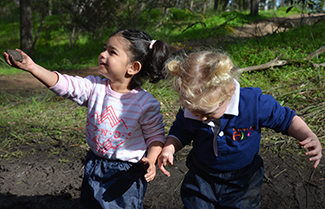In this edition
From the Director of Early Learning
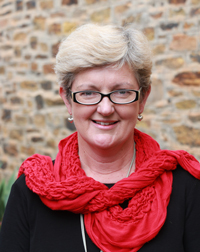 Dear Families,
Dear Families,
We had an incredible outdoor week with our Community Planting Day and Mud Week focus. These events highlight the importance of working together in a team. I would like to thank the initiative of Nell Tierney, Lia van der Pennen and Natalie Lockwood for organising these two events. It worked so well having them all in the same week, giving focus to outdoor learning and its many benefits, as you will read in the articles in this edition. For me it was so much more! It was about staff taking initiative, planning, negotiating, creating and liaising at so many different levels.
Firstly for the planting day both Lia and Natalie had been planning this event for weeks. It was embedded in our prior learning and was not an event plucked from the air. The girls had spent time with our Property Services team discussing the benefits of having a day that could really make a difference to our ELC environment. More importantly, a day that maximised everyone’s participation fr each age group, the families, the educators and Liam and Ned from Property Services. I hope you enjoyed hearing about the experiences from your child if they attended last Wednesday.om
Nell has written a lot about the importance of children experiencing mud. Even our Principal Ms Shea has told us of her childhood memories creating mud pies. I think we all can relate back to the freedom of being able to explore in the outdoors without the seriousness of all of the risk assessments. Last week I witnessed a significant shift in our centre, we stopped just talking about it and actually immersed ourselves in it. I loved the way the educators took small groups to the spot near the bridge in the park to explore the mud, the wet grass and puddles. The engagement was rich as children present differently outdoors to indoors so we are able to learn so much more about them.
Liam and Ned continue to be actively involved in the learning of our young students, supporting all of us with their knowledge and skill set that deepens our experiences.
I love the fact that my work is so creative and so deeply immersed in our community. We all think differently and have these creative skill sets to bring to student learning. We look forward to further developing our outdoor learning on a very regular basis.
Kind regards,
Kate Mount
Saints Café at ELC Events
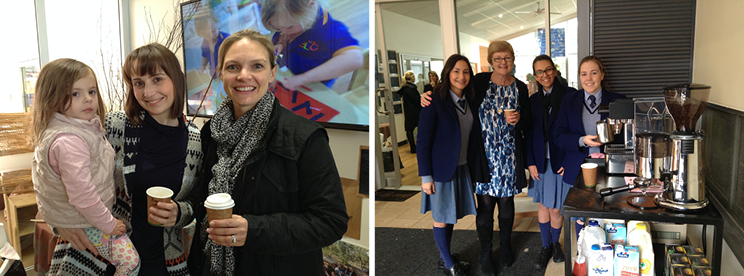
At our recent morning tea held in the ELC we were very fortunate to have the Saints Café provide our coffee. I asked the girls to write a summary explaining their purpose.
‘The Saint’s Café has been a long process to do. Starting all the way back in the first few weeks of Term 1. At the start of the year Ms Shea stood in front of the school and talked about leaders and encouraged students to be innovative in their studies and think about the qualities of an entrepreneur. Together with our teacher Ms Casson, Freya Ware, Holly Steer and myself came up with the idea of making a Saint’s Café. As a group Holly is in charge of the marketing, Freya is in charge of the staff and I am in charge the finance and budget. We did our first trial session for the café in the early weeks of May.
At the moment the Saints Café are supporting the local farmers by buying our milk from them, and we are using bio-degradable cups as they are better for the environment.
The Saints Café has given Freya, Holly and I such great opportunities to develop our people skills and to broaden our knowledge on how small businesses function.
By doing the Saints Café we have been asked to make coffees for different in-school events; one of them being the Early Learning Centre morning tea. This was a great opportunity to engage with the parents and children of the school.
We are hoping to pay off the food orders and coffee machine soon as we are planning on giving all our profits to a charity later on in the year.
Amira Shahin
Year 10 Food Student
Save the Date: Father’s Day Breakfast
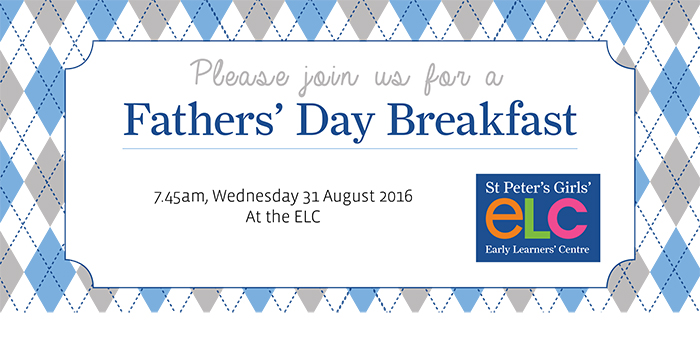
All ELC Father’s are invited to join us for our annual ‘Father’s Day Breakfast’ on Wednesday 31 August at 7.45am. As well as a delcious breakfast, our very own Saints Cafe will be providing coffee!
If you are interested please RSVP at the sign in sheet available at the ELC.
We look forward to seeing you all there!
ELC Dates for the Diary
- Wednesday August 31: Father’s Day Breakfast from 7.45am
- Monday,September 19 , Tuesday, Septmember 20 and Wednesday September 21: ELC Parent Teacher Conversations (schedule to come later)
News from the Stonyfell Room
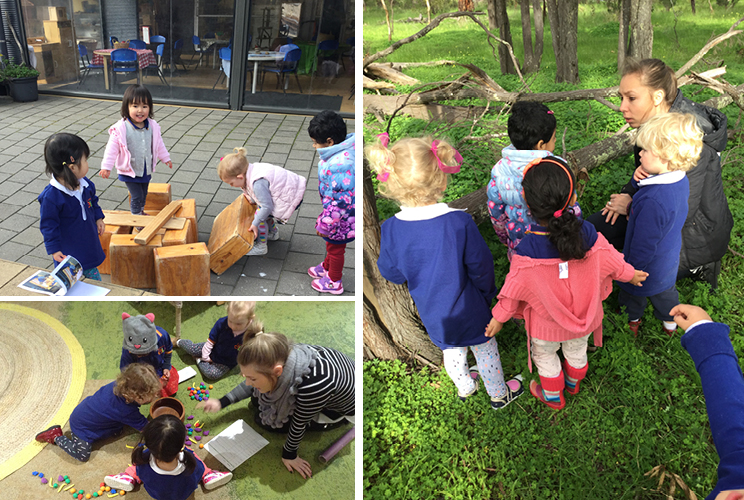
Making connections and the importance of being part of a group
Humans are social creatures, we seek each other out, we desire to be together and feel connected to each other. This notation has been highlighted throughout the Reggio Emilia philosophy and during my time last year in this beautiful city I was able to further build on my understanding of the importance of children working together and to be given the opportunity to work alongside each other and form strong collaborative bonds. Working in small groups is a strong declaration of our belief of how children best learn
Working in small groups:
- Develops social skills
- Creates a sense of belonging
- Allows us to test our theories
- Develops problem solving skills
- Builds relationships
- D evelops the child’s voice
When we are working in small groups with our children we can observe many things. The educators often use this time to not only develop and build on our inquiry but we can be using our learning focus as a catalyst for us to support our children. We may be wanting to build on their social skills such as sharing and turn taking or we may be focusing on language development and our speaking skills.
Being part of a group makes us feel like we belong, like we are connected and part of something. This in turn makes us feel safe, we develop trusting relationships and builds our desire to learn.
What does this look like in the Stonyfell Room?
The children in the Stonyfell Room are set up for working in small groups. The educators take the time to observe and discuss what we see and find during these experiences in order to drive the program and develop our curriculum and create differentiation between experiences and our leaners.
Linking into our program, environment and the setup of our spaces supports our children to work in small groups. Our learning invitations, materials and image of the child are all highly considered.
It is our role to introduce our Stonyfell children to being part of a group as this form of learning will continue through every child’s learning journey here at the ELC. We endeavour to build a culture of group from the outset. We are building a community of learners.
Laura Reiters
News from the Bell Yett Room
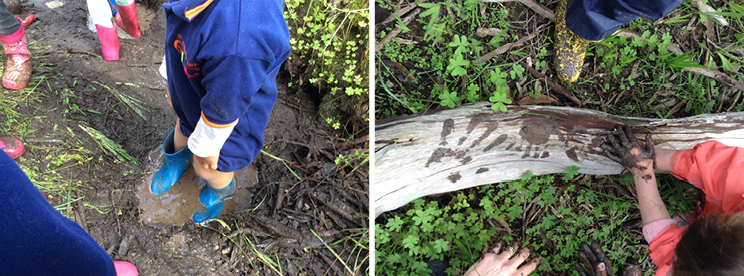
Lately I have been hearing a lot about ecological thinking in relation to early childhood education. It was at the forefront of my recent study tour to Reggio Emilia and there are professional learning opportunities and resources becoming available all the time. Our current legislation and educational guidelines, including the United Nations Convention on the Rights of the Child, the National Quality Standards and the Early Years Learning Framework, embrace sustainability as one of their leading standards.
Why has sustainability become such a key component of early childhood practice? Research suggests that children have an innate connection to nature, this relationship is often lost as we become adults. Children are competent and active citizens in their own learning. They are capable of being leaders and drivers of change. Early childhood educators have a powerful window of opportunity to play an active role in supporting young children to not only understand sustainability issues, but take action to minimise their impact on the environment.
In the ELC we embed nature in our daily pedagogy. By providing opportunities for learning about nature, with nature and in nature we are supporting children to develop a long lasting relationship with their environment. Special days such as our recent Planting Day and Mud Days enhance this. Our current Unit of Inquiry is challenging us as educators to empower our children to make a difference to their world. Over the last few weeks we have been immersing the children in experiences that have explored our planet and its amazing natural environments. The children have quickly demonstrated to us that they have a strong knowledge about and connection to their world. We are now exploring the impact of rubbish on our world. Through our observations we have learnt that the children already know that rubbish is a problem:
“People drop it on the ground, it should go in a rubbish bin.”
“The animals are sad that someone has put rubbish in their home.”
“We can make the animals happy by picking it up and putting it in the bin.”
What next? How can we build sustainable learning that has an ongoing impact?
We are relaunching our inquiry with an in-depth investigation into rubbish. Watch this space…
Leanne Williams
News from the Ferguson Room
Our fortune to have Ferguson Park on our doorstep has again been highlighted, as this 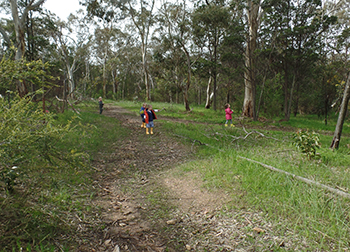 week we have utilised the space for our mud explorations and many walks. An exciting experience for us recently happened during a walk through the park. Our focus as educators was to encourage the children to work collaboratively on where they wanted to go. We listened with all of our senses to what the children were connected to, any causation theories they had and cooperation attitudes that were visible.
week we have utilised the space for our mud explorations and many walks. An exciting experience for us recently happened during a walk through the park. Our focus as educators was to encourage the children to work collaboratively on where they wanted to go. We listened with all of our senses to what the children were connected to, any causation theories they had and cooperation attitudes that were visible.
The first group decision was to explore the fallen tree, the direction to walk agreed by all. During the exploration, Bailey asked an educator “Can we visit the special bridge?” The children were invited to regroup for a decision-making conversation. Again, the children all wanted to walk to the bridge! Hurray! Children led the way, some breaking into a run at the front. “Wait for everyone!” they were told by their peers.
We reached a crossroads. “I want to go up this path, I’ve been to the bridge before” Will exclaims. “Me too!” agrees Charlie. They began to walk up a path, while the others in the group headed towards the bridge. “Wait! We have to stay as a group…we need to come back and decide where to go together!” Miss Foden told everyone.
The children came together and here we witnessed something magical happening. They started to talk about where they could go. At first, they thought it was easier to arrive at a shared decision and started walking off again in two separate groups. “No” Gabby shouted, “We have to stay together!” The group came back to convene. We saw Bailey and Clara orchestrate a way to choose a friend (for what, we are unsure!) “Put your foot in and we can choose” Bailey said. Some friends stayed on the outskirts of the discussion. We heard strong opinions as to where they wanted to go – Alessandra was sure she wanted to visit the bridge.
Negotiations lasted for nearly 10 minutes! Eventually the majority started walking up the path away from the bridge, with the exception of one friend. We then realised we needed to spend more time coming to a shared understanding and decided to start our walk at this very spot next time.
Where will this learning lead to next?
How can we extend children’s skills in cooperation, problem-solving and resolving conflict?
Can we predict what will be at the end of the different pathways? Can we map them out?
We are excited to see where this inquiry leads and what we discover during the process!
Pam Foden
News from the Hallett Room
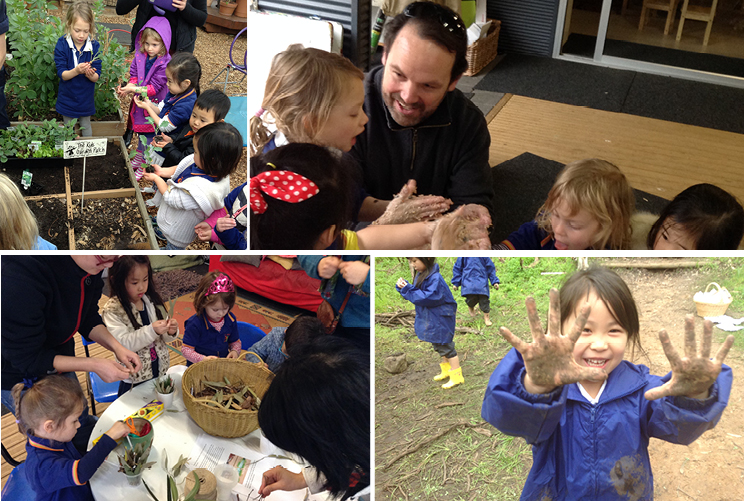
We have begun to uncover the children’s understanding of their planet. In the Hallett Room we have commenced by connecting the children’s knowledge with their senses. We asked the children what does our planet look like, sound like and smell like?
Matilda Priebe, “It looks like a beautiful place where you can have fun and play with your friends.”
Faith, “It looks like flowers.”
Rachel G, “You can’t hear the planet because it’s super quiet.”
Georgia, “Sometimes it’s noisy and loud.”
Isla, “When the animals make noise the planet is noisy too.”
Sophia, “It smells like flowers.”
Zoe, “It smells like flowers, trees, grass and bark.”
Lola B, “When you go to the airport and you get on a plane it smells like smoke.”
We then embraced our sense of touch when we participated in our Community Planting Day and Mud Day celebrations. Through these interactions with our natural environment and community, we have laid the foundations for building the children’s empathy and respect for the environment. We hope that through building this relationship the children will care enough to want to take action to care for their planet.
Sarah Croston-Melling
ELC Community Planting Day
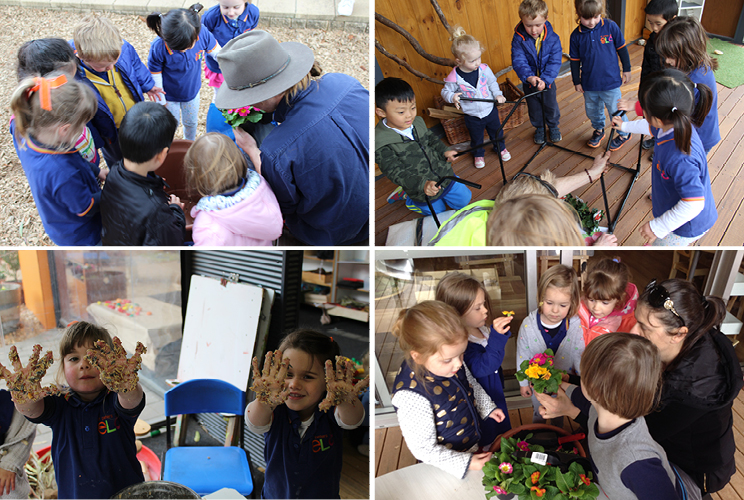
On Wednesday 10 August, the ELC children came together as a community to bring new life into our garden. As we begin to dive into our line of inquiry ‘sharing the planet’, many friends have begun to create links between themselves and the environment; in particular the beautiful places that surround our ELC.
With a variety of stations, the children immersed themselves in planting vegetables with their educators, constructing a greenhouse for strawberries with Liam and Ned (from the Property Services team), and making bird feeders and bug hotels with parent helpers. Through the entirety of the event, we saw children connect with their peers across the centre, as well as the adults who attended. This emphasised the trusting bonds within our school community.
As our garden grows and changes it will continue to provide opportunities for children to develop theories about our environment and our impact on it. We are excited to see that from our Community Planting Day the children have already begun to display how our connection to the planet creates a passion to care for it.
Lia van der Pennen and Natalie Lockwood
Hallett Room Excursion
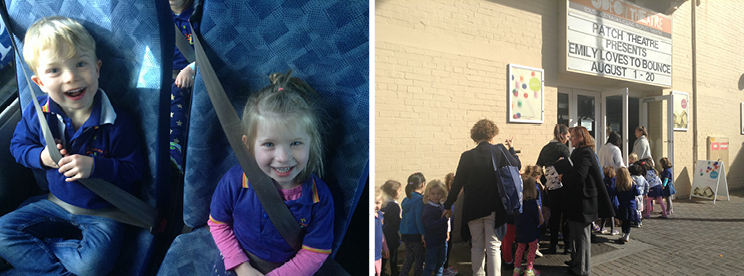
Last Monday, the Hallett Room children were treated to a special excursion to the Odeon Theatre, where we saw ‘Emily Loves to Bounce’ by the Patch Theatre Company.
This play was a wonderful tale of friendship between the energetic and creative Henry and the deep thinking, logical Amy. Although the two children are quite different they learn to work together to create imaginative games and stories. The actors were complemented by two musicians, a violinist and a cellist, who also played a number of other instruments throughout the show. The musicians worked on the stage with the actors, weaving themselves in and out of the story. Together they all played, sung and interacted together.
This was a highly entertaining piece of theatre for our children who were at times in stitches of laughter and at other times filled with wonder and intrigue by the magic of the light and shadow play as well of course by the main actor, Emily, the ball. Theatre is such an important experience for children. The creative arts inspire our imagination and fill us with enthusiasm to think about things from new perspectives.
I would like to thank our school bus drivers who drove us to and from the theatre. The children just loved travelling by bus, it was definitely a highlight!
International Mud Day in the ELC
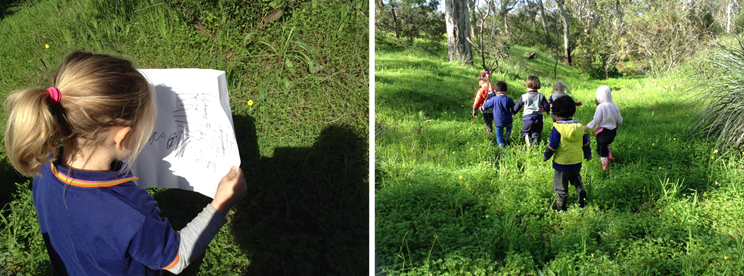
On Thursday and Friday we celebrated International Mud Day in the ELC. The day had finally come when the children were allowed into Ferguson Park to get as dirty as they liked and begin their life long connection with nature. Oh the joys of MUD! With protective pants, jackets and gum boots we navigated our way into the park in search of the grubby, gooey sticky substance. Luckily the weather had been kind to us during the week with heavy down pours so the creek was abundant with muddy puddles.
As educators we were over joyed to watch children jump straight into the puddles eager to get their boots dirty, slide down the creek bed, make mud cakes on rocks and fallen trees, dig for worms and insects, navigate their way along the creek bed and explore new territory.
Mixing soil, water and other natural materials like pebbles, leaves or grass provide children endless possibilities for learning and fun. Many of us have fond memories of creating mud pies, digging for worms or making streams and valleys in the mud. But it’s not just about fun. Children benefit from messy, muddy play.
Mud play is inclusive of all children. It allows play at their own developmental level, its open ended and meets the diverse needs and interests of different children. Younger and less skilled children might focus on the sensory experience whereas older children may have more specific goals in mind. Some children may like the sensation of the mud between their fingers while others only like to poke a stick into it.
Research shows that mud play also has health benefits. The exposure to the friendly bacteria in soil can lead to the release of endorphins and lead to happier and healthier children. It encourages creativity, can be soothing and relaxing and provide children the opportunity to express their feelings through their senses and exploration.
In the ELC we plan to officially open our Mud Kitchen this week. Liam in Property Services has done an incredible job in conjunction with the educators to create a space where children can create their own mud heaven on a daily basis. Using recycled materials gathered from around the school we are providing an environment where children can become scientists, communicators, independent thinkers, collaborators and develop and consolidate their own learning.
Please come and visit and join in the fun.
Nell Tierney
Bell Yett Room Educator
Magic Moment
